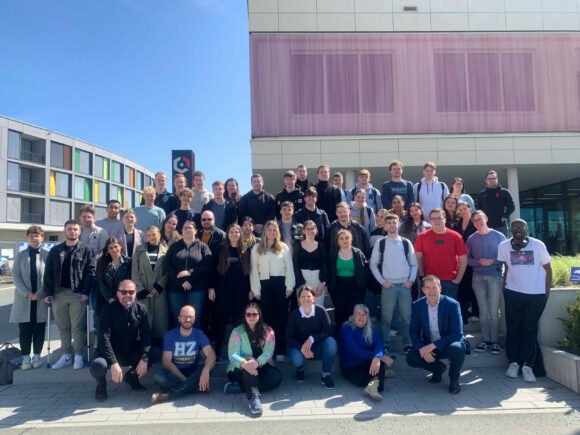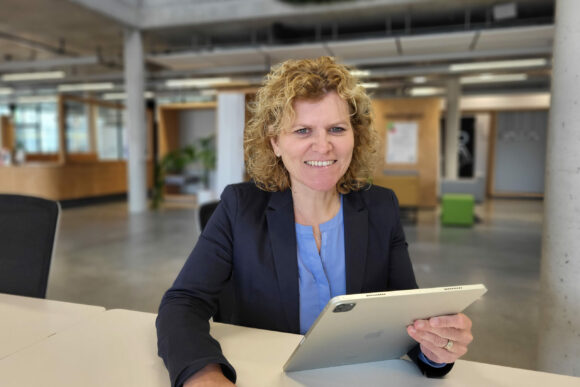With “VR2epair“, a new and exciting project at the Institute for Information Systems (iisys) recently celebrated its kick-off. The focus is on training supported by virtual reality, or more precisely: the repair of household electrical appliances. Project leader Prof. Dr. René Peinl explains in an interview with “campuls-digital” what exactly this is all about.

Prof. Peinl, you want to make it easier to repair broken appliances using VR technology. How can that work?
“We want to make the repair of electrical appliances more trainable for vocational training and continuing education. To do this, we simulate a number of common household appliances – e.g., high-quality cordless screwdrivers, microwaves or stereo systems – in a VR experience. Possible defects are then also simulated there. The troubleshooting, as well as the repair itself, then takes place in an interactive and immersive environment – hence the term immersive experiential learning. Our goal is that this program will later be able to run on all common VR headsets and thus be used across the board. Virtual reality technologies are already successfully used in various professional fields for learning practice-relevant contents in various application areas, e.g. in medicine or train maintenance. With increasingly affordable access to high-quality VR headsets, these learning options are gaining additional appeal.”

Image: Hof University of Applied Sciences;
Who is the offer aimed at or who should be able to use it later?
“The target group consists of electrical engineers in training and continuing education – especially in view of the new right to repair …”
What is meant by this?
“In2022, the EU Parliament adopted the EU Commission’s proposal on the right to repair in order to promote the reparability of products, extend the service life of products and thus initiate a reversal from the throwaway society. This means that in the future, more and more products should be repaired instead of being replaced by new products.”
And there are practical implementation difficulties and a need for training in this?
“Yes. Both trainees and already finished professionals in the field of adult education are not expected to have sufficient skills to implement this right to repair. Therefore, the legislative initiative may already fail because there are not enough trained professionals to implement it.”
After all, the repairs are often not worth it…
“Right. In the past, many products were poorly repairable and there was a glaring disparity between the comparatively low price of a new electrical appliance – often made with little manual labor in a low-wage country – and the comparatively high price of a manual repair in a high-wage country. Thus, the training of craftsmen for repair was also neglected. Customers were also often advised to purchase a new appliance with a view to improved functionality, lower ongoing energy costs and the higher margin for the craftsmen – instead of taking the risk of investing a lot of time in an attempted repair, which of course can fail.” And further:
In the future, equipment should have a better repair capability, and that means that continuing education in electrical engineering must also focus on this if the customer’s consideration is not to continue to favor a new purchase.”
Prof. Dr. René Peinl
And this is where Hof University of Applied Sciences and its focus on sustainability come into play?
“Yes, we would like to contribute to eliminating the existing qualification deficits in this area and to adapt the training to the needs of the labor market. But of course, ecological goals with regard to climate change also play an important role here.”
Let’s get back to the specific project: how practical can virtual learning actually be?
“In our simulation, the devices should be detailed enough so that the experience gained can be directly transferred to reality. Nevertheless, all intermediate steps, such as the loosening of screws, must be sufficiently abstracted so that the focus on the actual learning content or relevant work steps and processes is not impeded. Overall, we plan a high degree of interactivity, as this not only positively influences learning success, but also increases learning motivation.”
Why is that?
“Especially for continuing education, self-drive is crucial, as there is often no motivation left after a long day at work.” And further:
With VR-based learning scenarios, on the other hand, continuing education has a playful character, so it is highly motivating – especially now that virtual reality has not yet become commonplace, but is still very exciting for many.”
Prof. Dr. René Peinl

at Hof University of Applied Sciences (iisys) and head of the “VR2epair” project;
Image: Hof University of Applied Sciences;
How do you make sure this kind of learning works?
“The project will design and implement the learning experience and evaluate the results. To this end, in addition to immediate feedback after the training is completed, learning success checks will be conducted two weeks later to verify that the knowledge has been permanently embedded.”
Thank you for the interview!
Background:
The project “VR2epair” is supported with 60,000 EUR within the Erasmus program. In it, Hof University of Applied Sciences is cooperating with project partners Mindconsole from Graz and the Styrian Chamber of Commerce (WKStmk). It is scheduled to be completed by Nov. 30, 2024.

Disclaimer:
The European Commission support for the production of this publication does not constitute an endorsement of the contents which reflects the views only of the authors, and the Commission cannot be held responsible for any use which may be made of the information contained therein.







